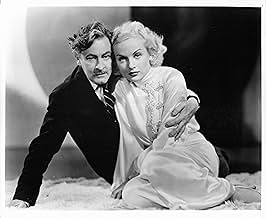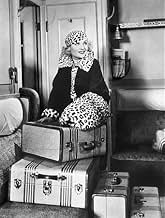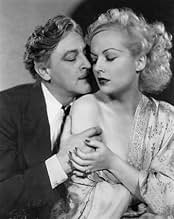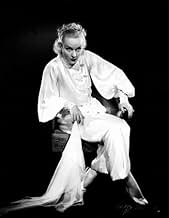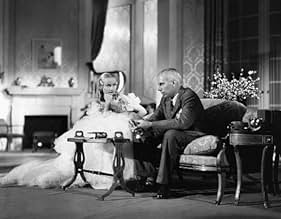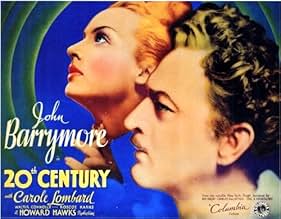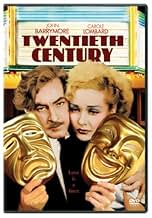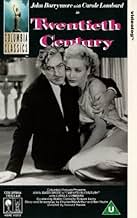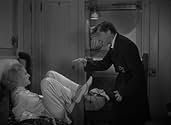NOTE IMDb
7,2/10
7,6 k
MA NOTE
Ajouter une intrigue dans votre langueA flamboyant Broadway impresario who has fallen on hard times tries to get his former lover, now a Hollywood diva, to return and resurrect his failing career.A flamboyant Broadway impresario who has fallen on hard times tries to get his former lover, now a Hollywood diva, to return and resurrect his failing career.A flamboyant Broadway impresario who has fallen on hard times tries to get his former lover, now a Hollywood diva, to return and resurrect his failing career.
- Réalisation
- Scénario
- Casting principal
- Récompenses
- 4 victoires et 1 nomination au total
Charles Lane
- Max Jacobs
- (as Charles Levison)
Bobby Barber
- Sign Painter
- (non crédité)
Herman Bing
- Beard #1
- (non crédité)
Lynton Brent
- Train Secretary
- (non crédité)
Anita Brown
- Black Stage Showgirl
- (non crédité)
James Burke
- Sheriff
- (non crédité)
James P. Burtis
- Train Conductor
- (non crédité)
Eddy Chandler
- Cameraman
- (non crédité)
Nick Copeland
- Treasurer
- (non crédité)
Avis à la une
Director Howard Hawks, impressed by Carole Lombard acting skills in her recent movies, took a gamble by giving the biggest role to her yet in May 1934's "Twentieth Century." The twenty-six year old actress had never been placed in such a prominent part in a big-budgeted major Hollywood movie before, this playing opposite the legendary, but temperamental John Barrymore. Hawks stuck out his neck to cast her as Mildred Plotka, a lingerie model-turned-actress, despite several more popular stars wanting the part for the Columbia Pictures movie.
Thus, the director was somewhat puzzled by Lombard's lack of spark in the first few days of filming. Hawks speculated it was either through a case of the jitters or from her previous experiences playing unemotional roles that was causing her to hold back. During a break, Hawks posed a question to the actress about what she would do if she heard from others that Barrymore said something derogatory about her behind her back. Lombard replied she would kick him in the groin. "Well, Barrymore said that, so why don't you kick him?" Such backstabbing got her blood pressure up, and she tore into the bewildered Barrymore, the actor not knowing where she was coming from. From that moment on, Lombard played Mildred with the energy Hawks was expecting from her. In fact, Barrymore, who played opposite of many of the screen's most respected veteran actresses, wrote on a photograph of himself to Lombard after filming wrapped, "To the finest actress I have worked with, bar none."
"Twentieth Century" is labeled as one of film's earliest screwball comedies. Adapted from a Charles Millholland unproduced play, 'Napoleon of Broadway,' the work was based on long-time eccentric theater producer David Belasco. He's the one who gave Gladys Marie Smith her stage name, Mary Pickford, reworking the young actress' middle name while selecting her mother's maiden name. The Ben Hecht/Charles MacArthur script shows Oscar Jaffe (Barrymore) treating Mildred (Lombard) harshly during the first days of a play's rehearsal. In one controversial scene where he wants the restrained Mildred to scream, Oscar picks up a sharp pin and jabs her in the buttocks. The incoming head of the Hays Production Code Office, Joseph Breen, not yet in total control of the censor bureau, was troubled with Barrymore's action with the pin.
Hawks had shot a close-up of the pin's penetration into the buttocks, which Breen promptly excised.
Barrymore was approached by Hawks to play the quirky stage producer. The actor asked why would the director think he was a good fit for the role? "It's the story of the biggest ham on earth, and you're the biggest ham I know," said Hawks. Barrymore agreed. Once filming began, the director encouraged his two leads to ad-lib their dialogue. He recalled later, "When people are as good as those two, the idea of just sticking to lines is rather ridiculous." Despite Barrymore's problematic drinking causing delays and reshoots in his recent productions, he was more dedicated to his craft under Hawks' watchful eye. In a rare day's absence from an evening of heavy drinking, Barrymore was so distraught he offered to work for two days for free. He made suggestions in several scenes that are seen on the screen, such as his disguise as a Kentucky Colonel to sneak onto the Twentieth Century train, which at the time was the most modern and fastest train used for the Chicago-New York express.
Lombard and Hawks were aware of Columbia studio head Harry Cohn's habit of making physical passes at new actresses working on his pictures, which he did with Carole. Cohn scheduled a meeting with the director in his office on the progress of the film. While the two were in conversation with Hawks far off to one side, Lombard barged in and exclaimed "I've decided to say yes!" pretending as though the studio president was alone. With the puzzled Cohn's mouth wide open, the actress began removing some of her clothes. Then Hawks cleared his throat and said, "I'd better get out of here if this is the kind of studio you run." The flustered Cohn politely asked the two to leave. The actress never got a wayward grouping of Cohn's hands nor any free-love comments from him again.
Lombard always remembered Hawks' sneaky maneuver at the expense of Barrymore to make her a better actress. Before every movie she was appeared, she sent the director a telegram announcing "I'm going to kick him." "Twentieth Century" proved pivotal in Lombard's career, with studios offering her larger, more prominent roles while her popularity soared worldwide.
Thus, the director was somewhat puzzled by Lombard's lack of spark in the first few days of filming. Hawks speculated it was either through a case of the jitters or from her previous experiences playing unemotional roles that was causing her to hold back. During a break, Hawks posed a question to the actress about what she would do if she heard from others that Barrymore said something derogatory about her behind her back. Lombard replied she would kick him in the groin. "Well, Barrymore said that, so why don't you kick him?" Such backstabbing got her blood pressure up, and she tore into the bewildered Barrymore, the actor not knowing where she was coming from. From that moment on, Lombard played Mildred with the energy Hawks was expecting from her. In fact, Barrymore, who played opposite of many of the screen's most respected veteran actresses, wrote on a photograph of himself to Lombard after filming wrapped, "To the finest actress I have worked with, bar none."
"Twentieth Century" is labeled as one of film's earliest screwball comedies. Adapted from a Charles Millholland unproduced play, 'Napoleon of Broadway,' the work was based on long-time eccentric theater producer David Belasco. He's the one who gave Gladys Marie Smith her stage name, Mary Pickford, reworking the young actress' middle name while selecting her mother's maiden name. The Ben Hecht/Charles MacArthur script shows Oscar Jaffe (Barrymore) treating Mildred (Lombard) harshly during the first days of a play's rehearsal. In one controversial scene where he wants the restrained Mildred to scream, Oscar picks up a sharp pin and jabs her in the buttocks. The incoming head of the Hays Production Code Office, Joseph Breen, not yet in total control of the censor bureau, was troubled with Barrymore's action with the pin.
Hawks had shot a close-up of the pin's penetration into the buttocks, which Breen promptly excised.
Barrymore was approached by Hawks to play the quirky stage producer. The actor asked why would the director think he was a good fit for the role? "It's the story of the biggest ham on earth, and you're the biggest ham I know," said Hawks. Barrymore agreed. Once filming began, the director encouraged his two leads to ad-lib their dialogue. He recalled later, "When people are as good as those two, the idea of just sticking to lines is rather ridiculous." Despite Barrymore's problematic drinking causing delays and reshoots in his recent productions, he was more dedicated to his craft under Hawks' watchful eye. In a rare day's absence from an evening of heavy drinking, Barrymore was so distraught he offered to work for two days for free. He made suggestions in several scenes that are seen on the screen, such as his disguise as a Kentucky Colonel to sneak onto the Twentieth Century train, which at the time was the most modern and fastest train used for the Chicago-New York express.
Lombard and Hawks were aware of Columbia studio head Harry Cohn's habit of making physical passes at new actresses working on his pictures, which he did with Carole. Cohn scheduled a meeting with the director in his office on the progress of the film. While the two were in conversation with Hawks far off to one side, Lombard barged in and exclaimed "I've decided to say yes!" pretending as though the studio president was alone. With the puzzled Cohn's mouth wide open, the actress began removing some of her clothes. Then Hawks cleared his throat and said, "I'd better get out of here if this is the kind of studio you run." The flustered Cohn politely asked the two to leave. The actress never got a wayward grouping of Cohn's hands nor any free-love comments from him again.
Lombard always remembered Hawks' sneaky maneuver at the expense of Barrymore to make her a better actress. Before every movie she was appeared, she sent the director a telegram announcing "I'm going to kick him." "Twentieth Century" proved pivotal in Lombard's career, with studios offering her larger, more prominent roles while her popularity soared worldwide.
As soon as this gem begins, we're dipped into great comedy. An egomanical producer (a very funny John Barrymore) takes lowly fashion model Mildred Plotka (equally funny Carole Lombard) and makes her the darling of Broadway. She rebels from his Svengali-like grasp and heads for Hollywood. Years later, Barrymore, armed with his sidekicks (tipsy Roscoe Karns and whiner Walter Connely) meet Lombard on a cross country train. During this insane adventure there's hammy Euro-trash Passion Play actors (They think "Moocher" is some sort of compliment), a kindly old religious nut (armed with repent stickers and bouncing checks) The finale verbal-physical spat of Lombard vs. Barrymore is not for the faint of heart! A Classic comedy Goldmine!!
If "The Lady With Red Hair" (about Mrs. Leslie Carter) gave us a good portrait of theatrical producer/director David Belasco (in the capable hands of Claude Rains), this film shows the ham side. Oscar Jaffe (John Barrymore) is based on Belasco, with his less attractive sides. Here is not the man who simply helped create proper modern stage production and rehearsal technique, but the egotistical side of him (the side Rains showed when he released all contacts to Leslie Carter -Miriam Hopkins in that film - when she dared to marry without his consent). Here Jaffe has created the actress sensation "Lily Garland" from an ambitious shop girl named Mildred Plotka (Carole Lombard). Jaffe has played a caring, fatherly Svengali to her, prodding her by caring, sweet, regretful terms to do what he wants (except they are rehearsing). But although - eventually - Lily is willing to become his lover, he is so jealous that he drives her to flee from him. He decides he can do it again, but falls on his face. She goes on to screen immortality in Hollywood. So he is forced to pull out all stops to get her back to a signed contract, when he learns she and he are traveling back to New York on the Twentieth Century train.
Howard Hawks would tackle farce several times in his career: "His Gal Friday", "I Was A Male War Bride", "Man's Favorite Sport" were all in the future. But this may have been the best of them. The other films have great choice moments, but this one is almost flawless from the start. Take the beginning when Jaffe brings the cast of his first play starring Lili. It is a piece of sentimental pap that Jaffe always produces (later on, before being dismissed by him, Charles Lane tells off Jaffe the truth that he produces hackwork and "gets away with it" because of Lili's talent). In fact, it is a spoof of a popular piece of melodrama from the late 1920s, "Coquette", which was turned into a film in 1929 (and netted Mary Pickford an Oscar, which she should have gotten for other films, such as "Sparrows"). The cast, including an African-American in a typical stereotype servant role of the period, have to go through several hours of rehearsing the first scene due to Mildred/Lily's failure to match Jaffe's exacting direction. What the overly controlling Jaffe does with stage blocking and a piece of chalk is a nightmare for anyone who has ever tried to produce or act in a play. He does, however, know about acting - he reminds Mildred/Lily that when she calls for "Daddy" in an old southern plantation house she is not to use a voice similar to calling "Taxi" in the street.
I won't go into the rest of the film, but wait for "the iron door" whose hinges get dingier and more rusted with each closing, or Barrymore's commentary on "the Passion Play". Lombard has a more subtle, reacting part, but she is Barrymore's equal partner, having the moment of reality at the center of the film: on the train, when after screaming at each other she breaks down and cries, and makes Jaffe realize that they have built themselves into an unhealthy universe where they can't be real people anymore. It's a brief, and touching moment - fortunately not destroying the sheer lovely nuttiness of the rest of the film.
Howard Hawks would tackle farce several times in his career: "His Gal Friday", "I Was A Male War Bride", "Man's Favorite Sport" were all in the future. But this may have been the best of them. The other films have great choice moments, but this one is almost flawless from the start. Take the beginning when Jaffe brings the cast of his first play starring Lili. It is a piece of sentimental pap that Jaffe always produces (later on, before being dismissed by him, Charles Lane tells off Jaffe the truth that he produces hackwork and "gets away with it" because of Lili's talent). In fact, it is a spoof of a popular piece of melodrama from the late 1920s, "Coquette", which was turned into a film in 1929 (and netted Mary Pickford an Oscar, which she should have gotten for other films, such as "Sparrows"). The cast, including an African-American in a typical stereotype servant role of the period, have to go through several hours of rehearsing the first scene due to Mildred/Lily's failure to match Jaffe's exacting direction. What the overly controlling Jaffe does with stage blocking and a piece of chalk is a nightmare for anyone who has ever tried to produce or act in a play. He does, however, know about acting - he reminds Mildred/Lily that when she calls for "Daddy" in an old southern plantation house she is not to use a voice similar to calling "Taxi" in the street.
I won't go into the rest of the film, but wait for "the iron door" whose hinges get dingier and more rusted with each closing, or Barrymore's commentary on "the Passion Play". Lombard has a more subtle, reacting part, but she is Barrymore's equal partner, having the moment of reality at the center of the film: on the train, when after screaming at each other she breaks down and cries, and makes Jaffe realize that they have built themselves into an unhealthy universe where they can't be real people anymore. It's a brief, and touching moment - fortunately not destroying the sheer lovely nuttiness of the rest of the film.
Why this loud talky mess gets top ratings from professionals stumps me (TMC, Maltin, et al.). The only thing I can figure is they're overly impressed by pedigree—namely Hawks, Lombard, Barrymore, and the writing team of Hecht and MacArthur. But once you get past the legendary reputations, the results are more annoying than impressive. It seems someone confused frenetic with amusing, while the arm waving babble is simply non-stop. It's like everyone will laugh if you just say it loud enough with enough spastic energy.
Barrymore, in particular acts like he's heck-bent on climbing the walls. But the lines aren't funny, and neither are the situations—reputations or no. Maybe the screenplay is aimed at show-biz types who will catch on to esoteric inside jokes. Some such is the only explanation I can think of. Hawks, fortunately, appears to have learned his lesson. His Binging Up Baby (1938) amounts to a masterpiece of madcap. It's everything this indulgent mess isn't, but should be. There appears to be a moral to this movie, but whatever it is, it's not a good one.
Barrymore, in particular acts like he's heck-bent on climbing the walls. But the lines aren't funny, and neither are the situations—reputations or no. Maybe the screenplay is aimed at show-biz types who will catch on to esoteric inside jokes. Some such is the only explanation I can think of. Hawks, fortunately, appears to have learned his lesson. His Binging Up Baby (1938) amounts to a masterpiece of madcap. It's everything this indulgent mess isn't, but should be. There appears to be a moral to this movie, but whatever it is, it's not a good one.
Completely over the top, silly but very funny, Twentieth Century makes the most of Carole Lombard and John Barrymore's comedic talents. This film marked the beginning of Lombard's fabulous career (tragically cut short in 1942) and the end of Barrymore's. They truly are two of the best performers that motion picture history has ever seen. I really envy Lombard's ability to laugh on cue, and Barrymore's ability to pull hilarious facial expressions.
Oscar Jaffe, (John Barrymore), a big time director, made Mildred Plotka now named Lily Garland a star, but HIS career is taking a battering after Lily packed up her life with him and on stage for Hollywood stardom. They accidentally meet on the Twentieth Century Limited and hilarity ensues! There is some fantastic physical comedy here and both Barrymore and Lombard are fantastic as the overly dramatic actor/director couple who are only real "from curtain to curtain". It's a great balance of drama/comedy.
My favourite part was definitely the start. I laughed out loud when Barrymore says "Dinga-linga-ling". After seeing him in Dinner at Eight (1933), I was surprised he had THIS much talent for comedy. Carole of course is her usual perfect self. I believe neither overshadows each other. I was very impressed with both of them. However, I have not forgotten the brilliant supporting cast, with the likes of Walter Connolly, Roscoe Karns and Ralph Forbes.
Twentieth Century is a classic screwball comedy which could please the harshest of critics. Dramatic, funny but in many ways climatic. I would have enjoyed it even it had been disappointing as all the fashions were absolutely divine! Wonderful to see Hollywood's greatest actors produce such fine work together. A classic through and through.
Oscar Jaffe, (John Barrymore), a big time director, made Mildred Plotka now named Lily Garland a star, but HIS career is taking a battering after Lily packed up her life with him and on stage for Hollywood stardom. They accidentally meet on the Twentieth Century Limited and hilarity ensues! There is some fantastic physical comedy here and both Barrymore and Lombard are fantastic as the overly dramatic actor/director couple who are only real "from curtain to curtain". It's a great balance of drama/comedy.
My favourite part was definitely the start. I laughed out loud when Barrymore says "Dinga-linga-ling". After seeing him in Dinner at Eight (1933), I was surprised he had THIS much talent for comedy. Carole of course is her usual perfect self. I believe neither overshadows each other. I was very impressed with both of them. However, I have not forgotten the brilliant supporting cast, with the likes of Walter Connolly, Roscoe Karns and Ralph Forbes.
Twentieth Century is a classic screwball comedy which could please the harshest of critics. Dramatic, funny but in many ways climatic. I would have enjoyed it even it had been disappointing as all the fashions were absolutely divine! Wonderful to see Hollywood's greatest actors produce such fine work together. A classic through and through.
Le saviez-vous
- AnecdotesJohn Barrymore once said that the role of Oscar was "a role that comes once in a lifetime" and even deemed this his favorite of all the movies he appeared in.
- Gaffes(at around 20 mins) O'Malley arrives at Lily's apartment. When she answers the door, he discards his newspaper twice between shots.
- Citations
Oscar Jaffe: Go on, Owen... tell her I'm dying... and DON'T OVERACT!
- Versions alternativesThere is an Italian edition of this film on DVD, distributed by DNA Srl. The film has been re-edited with the contribution of film historian Riccardo Cusin. This version is also available for streaming on some platforms.
- ConnexionsFeatured in The Men Who Made the Movies: Howard Hawks (1973)
- Bandes originalesHappy Days Are Here Again
(1929) (uncredited)
Music by Milton Ager
Lyrics by Jack Yellen
Sung a cappella by Walter Connolly
Meilleurs choix
Connectez-vous pour évaluer et suivre la liste de favoris afin de recevoir des recommandations personnalisées
- How long is Twentieth Century?Alimenté par Alexa
Détails
Box-office
- Montant brut mondial
- 9 800 $US
- Durée1 heure 31 minutes
- Couleur
- Rapport de forme
- 1.37 : 1
Contribuer à cette page
Suggérer une modification ou ajouter du contenu manquant

Lacune principale
By what name was Train de luxe (1934) officially released in India in English?
Répondre

